Ivy Talks
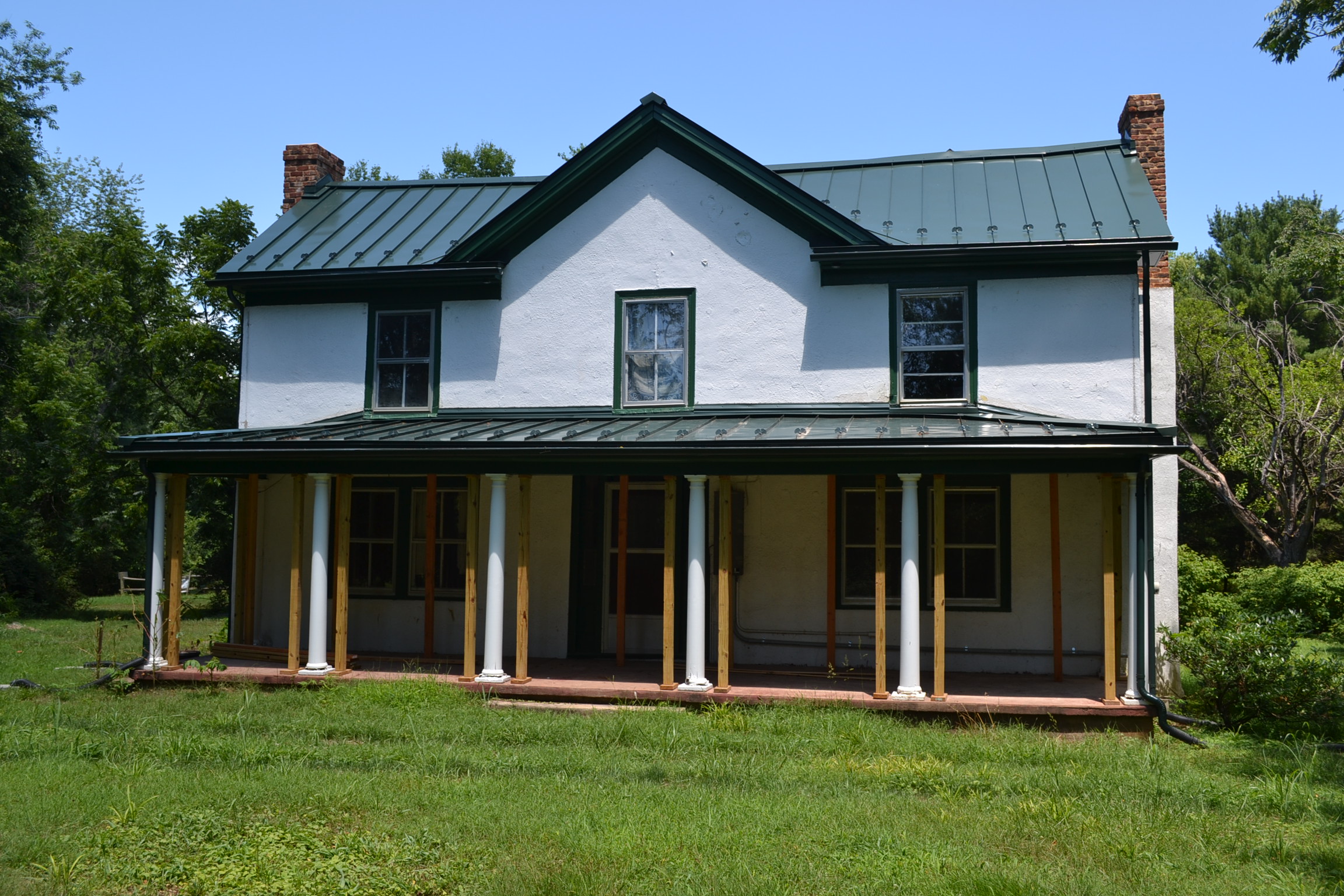
Ivy Talks are a lecture series that examines both the natural and cultural history of Ivy Creek Natural Area and River View Farm. Some of these talks focus on subjects that relate to the history of the Carr/Greer family and African-American life in Albemarle County during the 1800s and 1900s. Other talks in this series focus on the flora and fauna of Ivy Creek Natural Area and environmental issues that we are facing today. These talks are primarily being offered on Zoom. Many of these talks have been recorded; links to the videos on YouTube are found below under "Past Ivy Talks." All talks are free.
Upcoming Ivy Talks
The River View Farm House::An Architectural and Conservation Analysis (January 24, 2026, 2:00 PM)
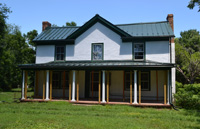 Join us online for this month’s Ivy Talk and learn about the Ivy Creek Foundation’s 2025 architectural survey of the River View Farm House. Ivy Creek is hosting three experts to lead you through the history of this National Register of Historic Places-recognized building and discuss its future.
Join us online for this month’s Ivy Talk and learn about the Ivy Creek Foundation’s 2025 architectural survey of the River View Farm House. Ivy Creek is hosting three experts to lead you through the history of this National Register of Historic Places-recognized building and discuss its future.
Historic architect and Ivy Creek board member Jody Lahendro will share the Foundation’s earlier work to discover and preserve the historic family home. Jess Harris, Assistant Director of Community Research at the Center for Community Partnerships and Descendants of Enslaved Communities of Virginia Board President, will share the process of creating focus group sessions with the Center for Community Partnerships. Learn about our community’s vision for the future of this valuable historic site.
Local architect and author of the architectural survey, Doug Gilpin, will conclude with the history of Hugh and Texie Mae Hawkins Carr’s 1880s farmhouse, and the later expansions by daughter Mary Carr Greer and her husband Conly Greer. We’ll see what the original house ‘might’ have looked like in 1890, and a photodocumentary of the additions/alterations to present day. Included are the findings of original paint colors, some ‘concealed condition’ images, and a Master Plan for the rehabilitation of this local historic treasure.
Stay until the end of the presentation for the opportunity to ask your questions about the farmhouse’s past or future!
Registration link here.
Past Ivy Talks
Shifting from Representation to Power in Community Work (March 25, 2025, 6:30 PM)
 Community work requires more than just representation—it demands a shift in power. In this talk, Dr. Sherica D. Jones-Lewis explores how research and community engagement must move beyond extractive models to center lived experiences, drive structural change, and foster genuine partnerships. Through real-world examples and interactive discussion, she will share strategies for shifting from inclusion to true empowerment in decision-making spaces.
Community work requires more than just representation—it demands a shift in power. In this talk, Dr. Sherica D. Jones-Lewis explores how research and community engagement must move beyond extractive models to center lived experiences, drive structural change, and foster genuine partnerships. Through real-world examples and interactive discussion, she will share strategies for shifting from inclusion to true empowerment in decision-making spaces.
Dr. Sherica D. Jones-Lewis is a leader in community-based research and people-centered systems change. As the Director of Community Research at The Equity Center at UVA, she works with grassroots organizations, policymakers, and institutions to drive solutions that empower historically marginalized communities. She has over 20 years of experience in Charlottesville and Albemarle County.
Dr. Jones-Lewis leads initiatives to ensure that communities are not just studied but are central to shaping solutions. She has played a pivotal role in projects such as the Community Fellows in Residence program and continuing dialogues on community safety. Her expertise includes strategic facilitation, coaching, and consulting through her business, JS Strategies, where she centers people and shifts power to foster lasting change. 
Shaping Justice: How Grassroots Activism, Policymaking Processes and Institutions Shape Environmental Justice Efforts (February 24, 2025, 6:30 PM)
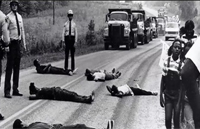 In this talk, Dr. Kimberly Fields will explore the development and adoption of three mid-Atlantic states’ first wave of Environmental Justice (EJ)-focused policies. Through these, she will examine the dynamic relationships between community activism, institutions, and the state's environmental justice efforts.
In this talk, Dr. Kimberly Fields will explore the development and adoption of three mid-Atlantic states’ first wave of Environmental Justice (EJ)-focused policies. Through these, she will examine the dynamic relationships between community activism, institutions, and the state's environmental justice efforts.
Drawing on several theories, Dr. Fields will analyze how grassroots activists shaped the content and form of these policies. She will look at critical moments when their efforts succeeded or faced limitations. This talk will illuminate the role of local, grassroots movements in influencing the substance of EJ policy, especially during the early stages of the policymaking process. Attendees will gain a deeper understanding of the challenges and opportunities for grassroots activism within the public policymaking landscape, and how these movements continue to impact environmental justice initiatives today.
Dr. Kimberly Fields is an Assistant Professor of African and African American Studies at the University of Virginia. Trained as a political scientist, she examines government responses to environmental inequality in the United States. Her interests, training and expertise lie at the intersection of Black politics, environmental studies, public policy, and state and local politics. Her recent work focuses on official government (state and local) efforts to address the racial dimensions of environmental inequality through public policy. In it she explores the development, implementation and political consequences of these efforts and analyzes the role(s) of political discourse, issue framing and policy-making processes in shaping government responses, institutional outcomes and political participation.
Fields holds a Ph.D. in political science from the University of Pennsylvania, an M.A. in political science from Howard University, and a B.A. in political science from Temple University. She is teaching a course this fall on the relationship between race, class, politics and the environment. 
Invasive Plants in Virginia: What Are They and How Do I Manage Them? (September 25, 2024, 6:30 PM)
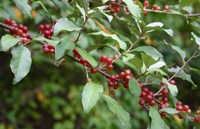 Invasive plants present a complex set of problems that require a range of actions to mitigate their impacts to land, native plants and animals, and the overall health of our environment. This session will identify specific challenges that invasive plants pose for conservation and explore the ways to realistically address them on your land.
Invasive plants present a complex set of problems that require a range of actions to mitigate their impacts to land, native plants and animals, and the overall health of our environment. This session will identify specific challenges that invasive plants pose for conservation and explore the ways to realistically address them on your land.
Rowena Zimmermann is the Director of Communications and Outreach for Blue Ridge PRISM. She has a long history of service in the nonprofit world – as an executive director, board member, employee, and volunteer. She was also a partner and principal grant writer for Virginia GrantWorks. Prior to her nonprofit work, Rowena was a senior analyst for JLARC (Joint Legislative Audit and Review Commission), the oversight agency for the Virginia General Assembly. She holds a master’s degree in public policy with a specialty in regulatory economics from William & Mary, and is also a writer who has been published in several literary journals.
Rowena recently completed Master Naturalist training, and looks forward to helping with many future conservation projects – especially with birds! She lives in Albemarle County with her family, dogs, and an unkempt yard. Her favorite wildflower is the spring beauty (Claytonia virginica). 
"Lifting As We Climb": River View Farm Women's Community Work (June 20, 2024, 6:30 PM)
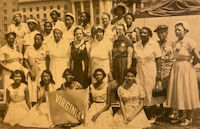 Learn about how some of the women of River View Farm participated in and led the local, state, and national African American Women’s social and literary clubs during Jim Crow and Civil Rights.
Learn about how some of the women of River View Farm participated in and led the local, state, and national African American Women’s social and literary clubs during Jim Crow and Civil Rights.
Before the Civil War, black and white women joined social clubs. However, these were often linked to the church or run by men. It was in the late 1800s that the Women’s Club Movement began, in which white middle-class women established national social and literary clubs. These clubs initially focused on self-improvement, but later expanded into societal reformation.
Largely left out of the Women's Club Movement, the African American Women’s Club Movement emerged. Middle-class African American women’s social clubs aimed to improve their conditions and those of all African Americans.
Our speaker, Mariah Payne, works at the Ivy Creek Foundation as the Education Coordinator. She graduated in December 2022 from Christopher Newport University with a Bachelors in History and Minors in Museum Studies and Psychology. She is a Hawkins descendant here at River View Farm and a descendant of the Gillettes at Monticello. 
Black Agrarianism: Historical Lessons for the Present and Future (December 6, 2023, 6:30 PM)
 It is easy to forget, and perhaps often intentionally ignored, that African Americans in the United States were first and foremost a people of the land, farmers. The life of Hugh Carr exemplifies how many black folks in the United States continued to live in the agrarian south. Hugh Carr was part of the Hydraulic Mills/Union Ridge community, and an examination of his life within this community provides essential insight into how the ancestors provided an oppositional consciousness-a way to think about life that could enable one to have positive self- esteem even amid harsh and brutal circumstances. Carr’s (as well as many of his contemporaries) legacy of self-determination and hard work continues to provide a living challenge to the enduring racist stereotype claiming that African Americans are lazy and unwilling to work independently without white supervision. However, an examination of the black agrarian lifestyle of individuals like Hugh Carr also illustrates a moral relationship with the land. This moral relationship resulted in the development of beloved communities where people looked out for each other and cared for one another. How did this form of blackagrarianism and beloved community develop? More importantly, how can this framework previously designed by the ancestors assist currently and into the future? According to bell hooks working the land, nurturing life, caring for crops and animals, gave African Americans of the past a place to dream and hope beyond race and racism, beyond oppressive and cruel white power. What lessons can be learned from this past and how can they inform the present and future? More specifically, how does the study of black agrarianism inform us about our relationship to the land (sustainability), food systems, community development, and democracy?
It is easy to forget, and perhaps often intentionally ignored, that African Americans in the United States were first and foremost a people of the land, farmers. The life of Hugh Carr exemplifies how many black folks in the United States continued to live in the agrarian south. Hugh Carr was part of the Hydraulic Mills/Union Ridge community, and an examination of his life within this community provides essential insight into how the ancestors provided an oppositional consciousness-a way to think about life that could enable one to have positive self- esteem even amid harsh and brutal circumstances. Carr’s (as well as many of his contemporaries) legacy of self-determination and hard work continues to provide a living challenge to the enduring racist stereotype claiming that African Americans are lazy and unwilling to work independently without white supervision. However, an examination of the black agrarian lifestyle of individuals like Hugh Carr also illustrates a moral relationship with the land. This moral relationship resulted in the development of beloved communities where people looked out for each other and cared for one another. How did this form of blackagrarianism and beloved community develop? More importantly, how can this framework previously designed by the ancestors assist currently and into the future? According to bell hooks working the land, nurturing life, caring for crops and animals, gave African Americans of the past a place to dream and hope beyond race and racism, beyond oppressive and cruel white power. What lessons can be learned from this past and how can they inform the present and future? More specifically, how does the study of black agrarianism inform us about our relationship to the land (sustainability), food systems, community development, and democracy?
Dr. Teresa E. Leslie is a scientist, community engagement specialist and educator. In addition to her published research investigating the interaction and delicate balance between people, the environment, animals, and pathogens, Dr. Leslie has authored books and articles that examine the inter-relationships between racism and classism, public/global health inequity and sustainable community development in both national and international contexts. From 2007-2013, she worked as a post doctorate fellow at the Naval Medical Research Center’s Viral and Rickettsial Disease Department, Infectious Disease Directorate in Silver Spring Maryland. Dr. Leslie worked for eight years as Director of the Eastern Caribbean Public Health Foundation and served for five years as President of the Board of (STENAPA), an environmental conservation organization. In both capacities she advised public health and agriculture agencies. Recently, she served as the Scientific and Educational Director of Baltimore VALUE (Vaccine Acceptance and Access Live in Unity, Education, And Engagement) at Johns Hopkins University.
She currently serves as the Director of Public Health Research at EcoRay, the senior education development specialist at Central Maryland AHEC, and a Public Health Associate at The Center for Religion and the City at Morgan State University. 
The Second Virginia Bird Breeding Atlas: A Bird Conservation Tool for the 21st Century (October 18, 2023, 6:30 PM)
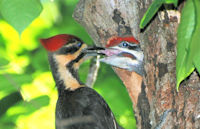
Sergio Harding holds a Master’s Degree in Biology from Virginia Tech, where his thesis work focused on the federally endangered Red-cockaded Woodpecker in North Carolina. Sergio has worked as a Nongame Bird Conservation Biologist with DWR since 2005. He oversees various avian projects and coordinates with other agencies on bird conservation issues. He is also the Virginia coordinator of the North American Breeding Bird Survey (BBS), and regularly participates in avian surveys. These have included breeding land bird surveys of Wildlife Management Areas, as well as surveys of bald eagles, peregrine falcons, golden-winged warblers, loggerhead shrikes and breeding marsh birds. 
Black Virginians in Blue: The Untold Stories of Albemarle County's US Colored Troops (September 17, 2023, 2 PM)
 Join us for our September Ivy Talk as we host Dr. William Kurtz, Dr. Kurtz's talk "Black Virginians in Blue: The Untold Stories of Albemarle County's US Colored Troops" tells the story of more than 250 Black men from Albemarle County and Charlottesville, VA, who served in the Union army or navy during the American Civil War. The talk is the result of almost five years of research and writing conducted by a team of UVA students under Dr. Kurtz's direction. Dr. Kurtz will discuss the incredible sacrifices this group of men made to save the Union and end slavery.
Join us for our September Ivy Talk as we host Dr. William Kurtz, Dr. Kurtz's talk "Black Virginians in Blue: The Untold Stories of Albemarle County's US Colored Troops" tells the story of more than 250 Black men from Albemarle County and Charlottesville, VA, who served in the Union army or navy during the American Civil War. The talk is the result of almost five years of research and writing conducted by a team of UVA students under Dr. Kurtz's direction. Dr. Kurtz will discuss the incredible sacrifices this group of men made to save the Union and end slavery.
Dr. William Kurtz was the former Managing Director and Digital Historian at the John L. Nau III Center for Civil War History at UVA. He received his PhD in History at the UVA in 2012. He has published two books and many articles related to the American Civil War. A past employee of Virginia Humanities, he is a veteran of a number of digital history projects including "Black Virginians in Blue," "UVA Unionists," "Founders Online," and "People of the Founding Era." 
God's Acre: Learning from African American Cemeteries (June 14, 2023, 6:30 PM)
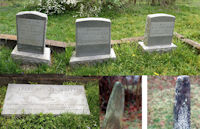 In her talk and book, "Hidden History," Lynn Rainville travels through the overlooked African American cemeteries of central Virginia to recover information crucial to the stories of the Black families who lived and worked there for hundreds of years. This illustrated lecture will present information from these historic graveyards to reveal attitudes towards death, religion, and the family. The talk will conclude with suggestions for how to re-locate, preserve, and share information about these sacred sites.
In her talk and book, "Hidden History," Lynn Rainville travels through the overlooked African American cemeteries of central Virginia to recover information crucial to the stories of the Black families who lived and worked there for hundreds of years. This illustrated lecture will present information from these historic graveyards to reveal attitudes towards death, religion, and the family. The talk will conclude with suggestions for how to re-locate, preserve, and share information about these sacred sites.
Lynn Rainville received her B.A. from Dartmouth College and her M.A. and Ph.D. from the University of Michigan. She has spent the last two decades studying Virginia’s historic cemeteries, enslaved communities, segregated schools, poor farms, and its role in World War I. Her grant-funded research has produced numerous articles and books. After 15 years as a college professor, Dr. Rainville founded an institute for public history and historic preservation at Sweet Briar College and, later, served as the Dean and chief academic officer. In 2019 she moved to Lexington to begin a new chapter in her career as the Executive Director of Institutional History and the Museums at Washington and Lee University, where she is also a professor of Anthropology. 
What Is a Prescribed Burn 101 (April 19, 2023,6:30 PM)
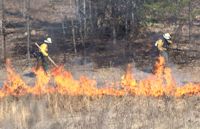 Fire can be an important tool for natural resource managers. Learn about fire’s historic use in Virginia, its benefits to ecosystems, how it can be used safely, and how Ivy Creek is using prescribed fire to maintain open field conditions.
Fire can be an important tool for natural resource managers. Learn about fire’s historic use in Virginia, its benefits to ecosystems, how it can be used safely, and how Ivy Creek is using prescribed fire to maintain open field conditions.
David Powell is a District Forester with the Virginia Department of Forestry, supervising a nine-county area in central Virginia. He has held a variety of positions with the department over the past 30 years. David has two forestry degrees, a B.S. from N. C. State University and M.S. from Virginia Tech. He lives in Albemarle County. 
MVFP: Connecting Communities with Local Farmers (March 22, 2023, 6:30 PM)
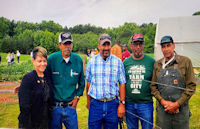 Our March 2023 Ivy Talk is presented by Sarah Morton from the Minority and Veteran Farmers of the Piedmont. She discusses their work as farmers and the important work of connecting with local communities.
Our March 2023 Ivy Talk is presented by Sarah Morton from the Minority and Veteran Farmers of the Piedmont. She discusses their work as farmers and the important work of connecting with local communities. 
History of Agriculture in America (February 19, 2023, 2:00 PM)


African American Fiddlers in Albemarle County (February 15, 2023, 6:30 PM)
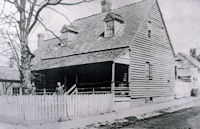 Based on his research as a 2020 Fellow of the International Center for Jefferson Studies, David McCormick leads occasional tours of downtown Charlottesville that illuminate the lives of the Scott and Hemings family fiddlers with stops at Maplewood Cemetery, the one-time sites of the Scott and Hemings family homes on Main Street, and a few other important landmarks like the Levy Opera House. In this online presentation, McCormick provides a virtual version of this tour, complete with a performance of fiddle tunes associated with the Scott and Hemings families.
Based on his research as a 2020 Fellow of the International Center for Jefferson Studies, David McCormick leads occasional tours of downtown Charlottesville that illuminate the lives of the Scott and Hemings family fiddlers with stops at Maplewood Cemetery, the one-time sites of the Scott and Hemings family homes on Main Street, and a few other important landmarks like the Levy Opera House. In this online presentation, McCormick provides a virtual version of this tour, complete with a performance of fiddle tunes associated with the Scott and Hemings families.
Leading the charge for early music in the 21st century, David McCormick is a multi-instrumentalist, scholar, and educator recognized for curating imaginative performances, creating educational opportunities for students of all ages, and guiding prominent arts organizations through the challenges of our time. In 2021, David took the helm of Early Music America as its sixth executive director, with the ambition of creating a more inclusive, equitable space for all who engage with historical performance.
As artistic director of Early Music Access Project, David plays baroque violin and vielle (medieval fiddle) and transforms thoughtful research into dynamic programming. David is a founding member of Alkemie, a medieval ensemble based in New York City, with whom he has appeared at Indianapolis Early Music Festival, Music Before 1800, and Amherst Early Music Festival. He is a 2017 recipient of Shenandoah Conservatory’s Rising Stars Alumni Award. 
Ivy Creek's Record of Deep Time (January 12, 2023, 6:30 PM)
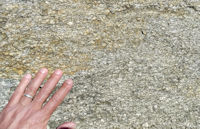 The geological history of the Charlottesville region stretches back more than a billion years into the ancient past. As this part of Earth has changed, new rocks and structures form. These rocks and structures interact with their predecessors, creating a composite record of past events. Taking a hike along the trails at Ivy Creek is an enjoyable way to get some exercise, but it’s also an opportunity to read a page in Earth’s autobiography. Geologist Callan Bentley will help translate that manuscript, teaching you to read Rock. Pairing Ivy Creek Natural Area’s outcrops with others in our region, a story emerges of the processes that built an ancient supercontinent, broke it apart, and then made another one in the same place!
The geological history of the Charlottesville region stretches back more than a billion years into the ancient past. As this part of Earth has changed, new rocks and structures form. These rocks and structures interact with their predecessors, creating a composite record of past events. Taking a hike along the trails at Ivy Creek is an enjoyable way to get some exercise, but it’s also an opportunity to read a page in Earth’s autobiography. Geologist Callan Bentley will help translate that manuscript, teaching you to read Rock. Pairing Ivy Creek Natural Area’s outcrops with others in our region, a story emerges of the processes that built an ancient supercontinent, broke it apart, and then made another one in the same place! 
Negro Extension Work in the American South: A Quest for Independence (December 14, 2022, 6:30 PM)
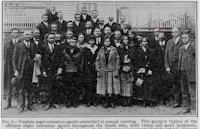 Watch the December 2022 Ivy Talk, "Negro Extension Work in the American South: A Quest for Independence." Conly Greer, who built the iconic barn at Ivy Creek Natural Area and Historic River View Farm, was Albemarle County's first African-American extension agent. Our speaker is Dr. Carmen Harris. Dr. Harris is a professor of history who teaches African-American, U.S., Southern, and Latin American history. Her research and teaching interests include African-American, Southern and South Carolina history. Dr. Harris served a six-year term as a member of the Board of Directors of the South Carolina Humanities Council, and has served on the Membership Committee and Minority Committee of the Southern Historical Association. Dr. Harris has published several articles and book chapters on various subjects related to African Americans in agricultural extension programs.
Watch the December 2022 Ivy Talk, "Negro Extension Work in the American South: A Quest for Independence." Conly Greer, who built the iconic barn at Ivy Creek Natural Area and Historic River View Farm, was Albemarle County's first African-American extension agent. Our speaker is Dr. Carmen Harris. Dr. Harris is a professor of history who teaches African-American, U.S., Southern, and Latin American history. Her research and teaching interests include African-American, Southern and South Carolina history. Dr. Harris served a six-year term as a member of the Board of Directors of the South Carolina Humanities Council, and has served on the Membership Committee and Minority Committee of the Southern Historical Association. Dr. Harris has published several articles and book chapters on various subjects related to African Americans in agricultural extension programs. 
Black Bears and Mange in Virginia (November 16, 2022, 6:30 PM)
 David Kocka, a District Wildlife Biologist with the Virginia Department of Wildlife Resources for the past 32 years, will be giving a talk on Virginia’s black bears, with an emphasis on the DWR’s efforts to understand the infestation and spread of sarcoptic mange in this relatively new host. David's current job responsibilities are the implementation of agency wildlife habitat and population programs over five counties in northwestern Virginia. In this position, he has spent considerable time on deer and black bear management issues. From 2014-2017, he also served as an Adjunct Professor at James Madison University teaching a Wildlife Management course. David holds degrees in Wildlife Management from West Virginia University (B.S.) and the University of Tennessee (M.S.) and has been a certified wildlife biologist since 1992. He has over 35 technical and/or popular publications to date, most recently publishing the book “Bear With Me, My Deer: Tails of a Virginia Wildlife Biologist” in 2017. In 2021 he was invited to become a member of the IUCN North American Bear Expert Team, which was created, in part, to increase capacity of the Bear Specialist Group and thereby increase bear conservation worldwide.
David Kocka, a District Wildlife Biologist with the Virginia Department of Wildlife Resources for the past 32 years, will be giving a talk on Virginia’s black bears, with an emphasis on the DWR’s efforts to understand the infestation and spread of sarcoptic mange in this relatively new host. David's current job responsibilities are the implementation of agency wildlife habitat and population programs over five counties in northwestern Virginia. In this position, he has spent considerable time on deer and black bear management issues. From 2014-2017, he also served as an Adjunct Professor at James Madison University teaching a Wildlife Management course. David holds degrees in Wildlife Management from West Virginia University (B.S.) and the University of Tennessee (M.S.) and has been a certified wildlife biologist since 1992. He has over 35 technical and/or popular publications to date, most recently publishing the book “Bear With Me, My Deer: Tails of a Virginia Wildlife Biologist” in 2017. In 2021 he was invited to become a member of the IUCN North American Bear Expert Team, which was created, in part, to increase capacity of the Bear Specialist Group and thereby increase bear conservation worldwide. 
What’s Up with Our Oaks? (October 16, 2022, 2:00 PM)
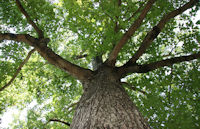 Oak decline is prevalent today across Virginia’s forests and landscapes. This syndrome is caused by a combination of factors, leading to decreased vigor and eventual death of older oak trees. To make matters worse, the prevalence of oaks as a forest component is also decreasing, mostly as a result of human activities and decisions. Come and learn what’s happening to our oaks, and what you can do to help the genus Quercus in Virginia.
Oak decline is prevalent today across Virginia’s forests and landscapes. This syndrome is caused by a combination of factors, leading to decreased vigor and eventual death of older oak trees. To make matters worse, the prevalence of oaks as a forest component is also decreasing, mostly as a result of human activities and decisions. Come and learn what’s happening to our oaks, and what you can do to help the genus Quercus in Virginia.
Our presenter, Ellen Powell, is the Conservation Education Coordinator for the Virginia Department of Forestry, based at the agency’s Charlottesville headquarters. 
Albemarle's Black Classrooms (September 18, 2022, 1:00 PM)
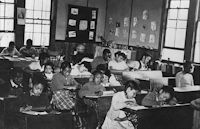 From post-emancipation education, to the first students to desegregate Albemarle County Public Schools. An update of his successful documentary film of the same name, in this presentation, filmmaker and storyteller Lorenzo Dickerson will share the history of the African-American educational experience. Pulling from local stories, research, as well as his own experience as a student in the county, Lorenzo will discuss one and two-room school houses, Rosenwald Schools, Brown v. Board, Jackson P. Burley High School, the Albemarle 26 and more. Expect a historical experience filled with visuals including archival photography, as well as video clips of local community members sharing first-hand experiences.
From post-emancipation education, to the first students to desegregate Albemarle County Public Schools. An update of his successful documentary film of the same name, in this presentation, filmmaker and storyteller Lorenzo Dickerson will share the history of the African-American educational experience. Pulling from local stories, research, as well as his own experience as a student in the county, Lorenzo will discuss one and two-room school houses, Rosenwald Schools, Brown v. Board, Jackson P. Burley High School, the Albemarle 26 and more. Expect a historical experience filled with visuals including archival photography, as well as video clips of local community members sharing first-hand experiences.
Lorenzo Dickerson is a filmmaker/photographer and founder of Maupintown Media with documentary films that focus on sharing stories of African-American history and culture in Virginia. Lorenzo's films have been shown in various film festivals, broadcast on PBS, and used as a teaching tool in K-12 and college classrooms throughout the country. His own Maupintown Film Festival is held annually at the Jefferson School African American Heritage Center in Charlottesville, Virginia.
A native of Charlottesville/Albemarle, Lorenzo earned a BBA in business management and MBA in marketing from Strayer University and got started as a filmmaker sharing the stories of his own family, including being enslaved at Castle Hill plantation, their participation in the Great Migration, attending an historic Rosenwald School, and desegregating Albemarle County Public Schools.
His dedication to community work in the local area was awarded with the 2019 Community Leadership Award from the Chamber of Commerce and Leadership Charlottesville, and he is a 2022 Community Fellow In-Residence at the Equity Center at the University of Virginia. Lorenzo now serves on the board of directors at Charlottesville's Paramount Theater, Preservation Piedmont as well as VPM’s Community Advisory Board. 
The Hemlock Woolly Adelgid (August 24, 2022, 6:30 pm)
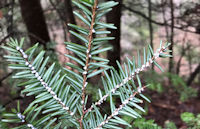

What It Means to Be a Descendant to Me (July 28, 2022, 6:30 pm)
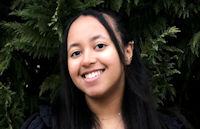 Mariah Payne is a rising senior at Christopher Newport University and was an intern at the Ivy Creek Foundation. Many years ago, one of her family members discovered their relation to the Gillettes, an enslaved family at Thomas Jefferson’s Monticello. Earlier this summer, Mariah also learned about her relation to Texie Mae Hawkins as her great great great aunt. In “What It Means to Be a Descendant to Me,” Mariah will share what she knows about each family and discuss her perspective as well as how it feels to learn about her own descendancy as an African American. She hopes to inspire others to research their family history and continue the dialogue on descendancy in central Virginia.
Mariah Payne is a rising senior at Christopher Newport University and was an intern at the Ivy Creek Foundation. Many years ago, one of her family members discovered their relation to the Gillettes, an enslaved family at Thomas Jefferson’s Monticello. Earlier this summer, Mariah also learned about her relation to Texie Mae Hawkins as her great great great aunt. In “What It Means to Be a Descendant to Me,” Mariah will share what she knows about each family and discuss her perspective as well as how it feels to learn about her own descendancy as an African American. She hopes to inspire others to research their family history and continue the dialogue on descendancy in central Virginia. 
Getting Started with Birding (June 9, 2022, 6:30 pm)
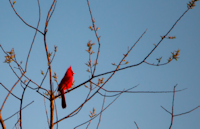 Caroline Bertrand was recently introduced to birding and is happy to share tips to assist you in your journey to learn more about birds and how to identify them. "Getting Started with Birding" covers "how-to" (by sight, by ear, by app...), "where to" (your backyard, Ivy Creek...), and about 10 common birds that are good to learn as beginners. Caroline says, "I have taken the PVCC bird class four times and I remember vividly standing in my yard, hearing 10 different things and only being able to identify two...I want to show the audience that it's possible to learn and that we now have super easy tools to do it."
Caroline Bertrand was recently introduced to birding and is happy to share tips to assist you in your journey to learn more about birds and how to identify them. "Getting Started with Birding" covers "how-to" (by sight, by ear, by app...), "where to" (your backyard, Ivy Creek...), and about 10 common birds that are good to learn as beginners. Caroline says, "I have taken the PVCC bird class four times and I remember vividly standing in my yard, hearing 10 different things and only being able to identify two...I want to show the audience that it's possible to learn and that we now have super easy tools to do it."
Caroline was kind enough to share her slide deck with us, which you can view here. Watch the talk here: 
Lucille Smith and the Albemarle Training School (May 26, 2022, 6:30 pm)
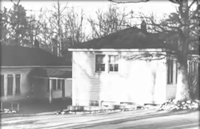 Mrs. Lucille Smith, the author of the upcoming book, The Three Area Segregated High Schools of Charlottesville and Albemarle County, will be speaking on Albemarle Training School (ATS) and the one- and two-room schools that fed into it. Mary Carr Greer, who inherited River View Farm from her father Hugh Carr and lived there for many years, was a principal at ATS.
Mrs. Lucille Smith, the author of the upcoming book, The Three Area Segregated High Schools of Charlottesville and Albemarle County, will be speaking on Albemarle Training School (ATS) and the one- and two-room schools that fed into it. Mary Carr Greer, who inherited River View Farm from her father Hugh Carr and lived there for many years, was a principal at ATS.
Mrs. Smith's talk will draw from her book, which will highlight the educational system for African American children in Charlottesville and Albemarle County in 1926 to 1951, when Jackson P. Burley High School was built and the three area schools were closed. The schools were overcrowded, with as many as 244 students being taught in five or six rooms. Many of the schools of Albemarle County began as makeshift facilities, in need of repair, poorly heated, ventilated and the teachers and students only had access to worn, second-hand books for teaching and learning. Twelfth grade was not offered until Burley High School opened. The book will capture some of the story of brave parents, community and religious leaders who were on a mission to achieve a better education for their children. 
Bringing Natives Home (April 20, 2022, 6:30 pm)
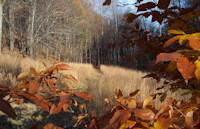 Join us for our April talk with Cathy Clary to learn about planting natives in your garden. Cathy lives in Afton, Virginia, where she writes a blog and consults on the home landscape (www.hollowgarden.com). She taught horticulture and landscape design for the University of Virginia's Personal Enrichment program (www.scps.virginia.edu) for 14 years, worked as Head Gardener at Albemarle House, Landscape Supervisor at Morven Estate, and Gardener at Monticello. As a freelance writer, her columns and articles have appeared in C-VILLE Weekly and Abode, Virginia Gardener, Virginia Living, Fine Gardening, and the Virginia Garden Guide.
Join us for our April talk with Cathy Clary to learn about planting natives in your garden. Cathy lives in Afton, Virginia, where she writes a blog and consults on the home landscape (www.hollowgarden.com). She taught horticulture and landscape design for the University of Virginia's Personal Enrichment program (www.scps.virginia.edu) for 14 years, worked as Head Gardener at Albemarle House, Landscape Supervisor at Morven Estate, and Gardener at Monticello. As a freelance writer, her columns and articles have appeared in C-VILLE Weekly and Abode, Virginia Gardener, Virginia Living, Fine Gardening, and the Virginia Garden Guide. 
Minnie Lee McGehee and the Rivanna River (March 24, 2022, 6:30 pm)
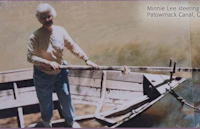 Minnie Lee McGehee, a native of Fluvanna County, played an important role in the effort to get the Rivanna River designated as a Virginia Scenic River. She served on the Rivanna Scenic River Advisory Committee and wrote Mr. Jefferson's River: The Rivanna, a book about the history of navigation, mills and communities along the Rivanna. She researched and wrote about Fluvanna County History for the Fluvanna County Historical Society for half a century and uncovered much lost knowledge of local history. In addition to history, she had a great love of the outdoors and plants of all kinds. Her book on the Rivanna ends with a plea for its preservation.
Minnie Lee McGehee, a native of Fluvanna County, played an important role in the effort to get the Rivanna River designated as a Virginia Scenic River. She served on the Rivanna Scenic River Advisory Committee and wrote Mr. Jefferson's River: The Rivanna, a book about the history of navigation, mills and communities along the Rivanna. She researched and wrote about Fluvanna County History for the Fluvanna County Historical Society for half a century and uncovered much lost knowledge of local history. In addition to history, she had a great love of the outdoors and plants of all kinds. Her book on the Rivanna ends with a plea for its preservation. 
African American Farmers and the Challenges They Face (February 20, 2022, 2 pm)
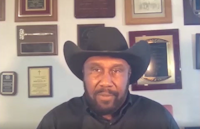
In 1995, Boyd founded the National Black Farmers Association after encountering the US Department of Agriculture's discriminatory practices first-hand and meeting many more black farmers who shared this experience. Boyd soon led NBFA members in a march on the White House. He went on to meet with President Clinton and to testify before Congress. The plight of Black farmers had caught the nation's attention, but Boyd's pursuit of justice continues to this day. Boyd lives in Baskerville, Virginia where he continues to work his farm. 
African American Farmers in Albemarle County (February 17, 2022, 7 pm)
 Join us as we explore the lives of African American farmers in Albemarle County and the trials, tribulations, and triumphs that they faced. We will host descendants from three different African American farming families in Albemarle County. We will explore who these farmers were, how farming supported their livelihoods, and how they contributed to their communities. These farmers were Mr. James R. Butler, who served as the Extension Agent after Conly Greer retired, Mr. Willie Hudson, of Esmont, and Mr. Kenton Sheffield Gardner, of Esmont.
Join us as we explore the lives of African American farmers in Albemarle County and the trials, tribulations, and triumphs that they faced. We will host descendants from three different African American farming families in Albemarle County. We will explore who these farmers were, how farming supported their livelihoods, and how they contributed to their communities. These farmers were Mr. James R. Butler, who served as the Extension Agent after Conly Greer retired, Mr. Willie Hudson, of Esmont, and Mr. Kenton Sheffield Gardner, of Esmont. 
Efforts to Restore the American Chestnut in Virginia, Setbacks, and Progress (January 23, 2022, 2 pm)
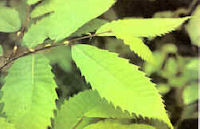 Tom Wild will be presenting our January talk on Chestnut Restoration in Virginia. Tom grew up in the Tidewater area of VA. His previous career was in geology, working for 25 years for Chevron, specializing in downhole sensing technology, interpretation, research and teaching. He and his wife Anne moved to Charlottesville in 2008, where he has worked as a consultant for oil, environmental firms, and the US Geologic Survey. Today he is fully retired and is involved with the Charlottesville Albemarle SPCA and numerous nature organizations, including the Rivanna Master Naturalists, Charlottesville Area Tree Stewards, Ivy Creek Foundation and VA chapter of The American Chestnut Foundation. Tom has been working with the Chestnut Foundation since 2015 and is currently the chapter secretary.
Tom Wild will be presenting our January talk on Chestnut Restoration in Virginia. Tom grew up in the Tidewater area of VA. His previous career was in geology, working for 25 years for Chevron, specializing in downhole sensing technology, interpretation, research and teaching. He and his wife Anne moved to Charlottesville in 2008, where he has worked as a consultant for oil, environmental firms, and the US Geologic Survey. Today he is fully retired and is involved with the Charlottesville Albemarle SPCA and numerous nature organizations, including the Rivanna Master Naturalists, Charlottesville Area Tree Stewards, Ivy Creek Foundation and VA chapter of The American Chestnut Foundation. Tom has been working with the Chestnut Foundation since 2015 and is currently the chapter secretary. 
Promoting Biodiversity at Ivy Creek: Fire, Deer, and Invasive Species Management (December 5, 2021, 2 pm)
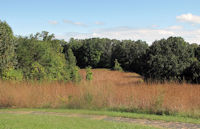 Maximizing biodiversity in a place such as the Ivy Creek Natural Area requires active intervention. John Scrivani will discuss past and future biodiversity projects at Ivy Creek. John received his PhD in Forest Management from Oregon State University in 1985. After teaching forestry at Virginia Tech for four years, John took a Research Forester position with the Virginia Department of Forestry, where he managed field research, pine breeding, and forest inventory. John joined the Ivy Creek Board of Directors in 1998 and served as President in 2000 and 2001. John led the efforts to establish the warm-season grass fields and helped conduct the first prescribed burns at Ivy Creek. John retired in 2017, to teach part-time at the University of Richmond, and to devote his volunteer efforts towards ecologic restoration, with both The American Chestnut Foundation and the Ivy Creek Foundation.
Maximizing biodiversity in a place such as the Ivy Creek Natural Area requires active intervention. John Scrivani will discuss past and future biodiversity projects at Ivy Creek. John received his PhD in Forest Management from Oregon State University in 1985. After teaching forestry at Virginia Tech for four years, John took a Research Forester position with the Virginia Department of Forestry, where he managed field research, pine breeding, and forest inventory. John joined the Ivy Creek Board of Directors in 1998 and served as President in 2000 and 2001. John led the efforts to establish the warm-season grass fields and helped conduct the first prescribed burns at Ivy Creek. John retired in 2017, to teach part-time at the University of Richmond, and to devote his volunteer efforts towards ecologic restoration, with both The American Chestnut Foundation and the Ivy Creek Foundation. 
The History of the Monacan Nation and Town of Monasukapanough (November 7, 2021, 2 pm)
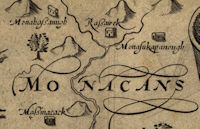 Ivy Creek Foundation was thrilled to host Edith Branham and Teresa Pollak of the Monacan Nation and Jeff Hantman, UVA Professor Emeritus, on November 7th, 2021. The three discussed the history of the Monacan Nation and the Monacan town Monasukapanough, which was once located on the Rivanna River just down from where Ivy Creek Natural Area is now located.
Ivy Creek Foundation was thrilled to host Edith Branham and Teresa Pollak of the Monacan Nation and Jeff Hantman, UVA Professor Emeritus, on November 7th, 2021. The three discussed the history of the Monacan Nation and the Monacan town Monasukapanough, which was once located on the Rivanna River just down from where Ivy Creek Natural Area is now located. 
Our Public Treasure: An Update on Ivy Creek Foundation's Efforts to Preserve and Interpret River View Farm (April 11, 2021, 2 pm)
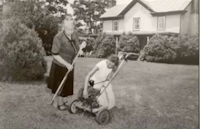
Liz Sargent is a historical landscape architect, and principal of Liz Sargent HLA, a historic preservation firm based in Charlottesville. Liz is a former Board Member of Ivy Creek Foundation and lead of the Farmhouse study group that took the lead on preparing a National Register of Historic Places nomination for River View Farm. The group included many dedicated supporters who conducted extensive research into the history of River View Farm and the Carr-Greer Farmhouse in order to guide appropriate preservation and interpretation strategies for the future. This work continues under the auspices of the Foundation's Education Committee. Liz continues to contribute to this process by sharing her experience working on similar projects throughout the country.
Jody Lahendro is the Supervisory Historic Preservation Architect at UVA's Office of Facilities Management. His advice has been critical in the stabilization work being performed on the Carr-Greer Farmhouse and its outbuildings. 
Bringing Back the Bluebird: How Can You Be Part of It? (March 14, 2021, 2 pm)
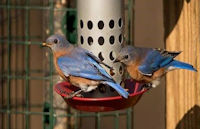 In the 1970s the populations of Bluebirds plummeted and their future was in question. Please join us for this exciting talk about one of the greatest conservation stories in America with the comeback of the Eastern Bluebird. Mike Bishop, native Virginian and master naturalist, will recount how the grassroots campaign that established trails of housing for the birds has brought back their numbers dramatically through the help of volunteers.
In the 1970s the populations of Bluebirds plummeted and their future was in question. Please join us for this exciting talk about one of the greatest conservation stories in America with the comeback of the Eastern Bluebird. Mike Bishop, native Virginian and master naturalist, will recount how the grassroots campaign that established trails of housing for the birds has brought back their numbers dramatically through the help of volunteers.
Mike is a native Virginian that has been interested in all wildlife since an early age. Since 1982 Mike has been involved with Bluebirds and Purple Martins where he established trails and colonies on his parent's property in Spotsylvania County, VA.Mike retired after 37 years in public safety, several years as a professional firefighter and then serving 21 years with the Fairfax County Police Dept. Retaining his lifelong love for the environment and native animals, he became a Virginia Master Naturalist in 2013 and was hired as a part time naturalist for the Fairfax County Park Authority, instructing school students in stream and watershed ecology. He is also a Board member of the Virginia Bluebird Society. In 2015 he founded the Northern Virginia Purple Martin Initiative that has a mission statement of "Saving our native wildlife through direct action." To date it has established 23 Martin colonies, 4 Bluebird trails, a Wood Duck Trail and a Kestrel project on public lands. 
Bird's Eye View: Exploring the Historical Landscape of Ivy Creek Natural Area from Above (February 14, 2021, 2 pm)
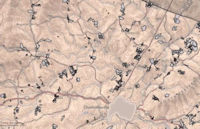

Virginia's Bears: Forest, Field, and Front Porch (Sept. 10, 2017)


Bees and Beekeeping in Today's World (March 12, 2017)
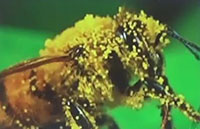 Karen and Ken Hall of the Central Virginia Beekeepers Association discuss the role of honeybees and beekeeping in modern society, and how we can enhance and protect them as a valuable resource. Their talk addresses such questions as, "Why do honeybees swarm?", "Are they taking pollen and nectar that would otherwise go to native bees?" and "Will honeybees survive?"
Karen and Ken Hall of the Central Virginia Beekeepers Association discuss the role of honeybees and beekeeping in modern society, and how we can enhance and protect them as a valuable resource. Their talk addresses such questions as, "Why do honeybees swarm?", "Are they taking pollen and nectar that would otherwise go to native bees?" and "Will honeybees survive?" 
Bound to the Fire: Slavery, Race and Food in 18th and 19th Century Virginia (Nov. 13, 2016)
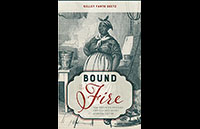 This talk focuses on enslaved cooks at Virginia plantations including Thomas Jefferson's Monticello and George Washington's Mount Vernon, revealing how these enslaved persons were literally "bound to the fire," and yet, in these sweltering and often fetid conditions, produced delicious, complex, labor-intensive dishes which have influenced modern American cuisine. Dr. Deetz's book, "Bound to the Fire" is available for sale.
This talk focuses on enslaved cooks at Virginia plantations including Thomas Jefferson's Monticello and George Washington's Mount Vernon, revealing how these enslaved persons were literally "bound to the fire," and yet, in these sweltering and often fetid conditions, produced delicious, complex, labor-intensive dishes which have influenced modern American cuisine. Dr. Deetz's book, "Bound to the Fire" is available for sale. 
Waterworks: A History of the Local Water Supply, 1819-2016: A Drama Unfolding in Two Acts (Sept. 11, 2016)


It Will Take Care of You: Farming in Albemarle County, VA in the 1930s to 1950s (May 22, 2016)
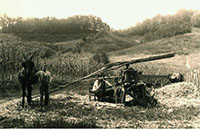

African American Heritage Trail Map: Union Ridge (Feb. 14, 2016)
 After the Civil War, the ridge crossed by the present-day roads of Hydraulic, Georgetown, and Woodburn was settled by emancipated African American families who created a vibrant farming community. Today the African American Heritage Trail Map: Union Ridge explores this area. Ivy Creek Natural Area is the first stop on the tour, as it is situated on the former River View Farm, once the largest African American-owned farm in the area. This talk goes into more depth about the untold African American history of this area.
After the Civil War, the ridge crossed by the present-day roads of Hydraulic, Georgetown, and Woodburn was settled by emancipated African American families who created a vibrant farming community. Today the African American Heritage Trail Map: Union Ridge explores this area. Ivy Creek Natural Area is the first stop on the tour, as it is situated on the former River View Farm, once the largest African American-owned farm in the area. This talk goes into more depth about the untold African American history of this area. 